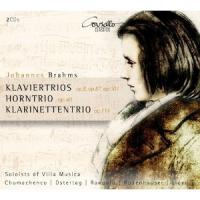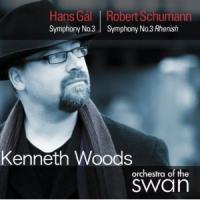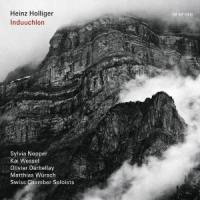Classical CDs Weekly: Brahms, Gál, Holliger, Schumann | reviews, news & interviews
Classical CDs Weekly: Brahms, Gál, Holliger, Schumann
Classical CDs Weekly: Brahms, Gál, Holliger, Schumann
German chamber music, Swiss modernism and Viennese classics
Brahms composed trios throughout his life - these well-loved pieces contrast with the much rarer works of Hans Gal and the oboist Heinz Holliger, here exposed in his parallel career as a composer.
 Brahms Piano Trios, Horn Trio, Clarinet Trio Soloists of Villa Musica (Covellio Classics)
Brahms Piano Trios, Horn Trio, Clarinet Trio Soloists of Villa Musica (Covellio Classics)
Brahms’s B Major Piano Trio was originally composed in 1859 but was drastically revised and republished in 1889. Writing to his publisher about the later version, the one generally played today, Brahms felt that “although the old version is bad, I do not maintain that the new one is good!” It’s a fascinating mixture of early and late styles – more expansive than mature Brahms, though transition passages and developments feel like the work of an older, wiser composer. More consistent is the Second, C Major Trio – tautly assembled in the outer movements with a brilliant, Hungarian-inflected Andante. The Third Trio is a good example of Brahms in grumpier, gruffer mode; it’s the tersest, most compact of the set.
They’re given here in reassuringly direct, unfussy performances by an ensemble associated with the Villa Musica Foundation, a state-funded German body providing chamber music tuition for gifted students. Estonian pianist Kalle Randalu is calmly responsive, matched by Nicholas Chumachenco and Martin Osertag on violin and cello, the three playing with no hint of flashiness or ego. We also get a lovely performance of the early Horn Trio, in which the soloist is the British virtuoso Frank Lloyd – one-time member of the Philip Jones Brass Ensemble and now resident in Germany. His darker, bolder sound makes the work feel more autumnal than Sarah Willis’s more youthful, lyrical reading.
The highlight for me is the inclusion of the sublime 1891 Clarinet Trio – perfect, "late" music – world-weary, melodically rich and quietly ecstatic, despite the music's minor key. Ulf Rodenhäuser, one-time principal clarinet of the Berlin Philharmonic, is a warm, velvet-toned soloist.
 Hans Gál – Symphony no 3, Schumann – Symphony no 3 Orchestra of the Swan/Kenneth Woods (Avie)
Hans Gál – Symphony no 3, Schumann – Symphony no 3 Orchestra of the Swan/Kenneth Woods (Avie)
Avie continue their Hans Gál symphony revival with another disc pairing his music with an established Austro-German work. Born in Austria in 1890, Gál enjoyed a successful compositional and academic career in Germany before fleeing to Britain in 1939, eventually obtaining a post at Edinburgh University. His Third Symphony was completed in 1952 and has lain dormant for 55 years. Hopelessly anachronistic, it glances wistfully back at the world which Gál had left behind; the music of an exotic emigré marooned in rainy post-war Edinburgh.
Gál’s impassioned, well-crafted late romanticism is readily accessible and quietly moving - there’s a lot to enjoy here. He’s good at subtle transitions – the way that the delicious opening melody segues into the first movement’s more agitated fast section, and its brilliant, ghostly close. Only the Finale left me baffled, with a stentorian opening quickly yielding to a triumphant ending which feels a little too easily achieved. It’s nicely played by Stratford-upon-Avon’s Orchestra of the Swan under Kenneth Woods, who are up against stiffer, famous-name competition in Schumann’s Rhenish Symphony.
In this brilliant, exuberant work, Woods takes full advantage of his orchestra’s modest size, choosing swift speeds and enjoying well-articulated string playing. The Scherzo has an appealing village band feel, and Wood’s trombones in the stark contrapuntal fourth movement are faultless. The same material’s major key reprise in the last movement is a great moment, prefiguring the brassy chorales heard at the end of Brahms’s First and Mahler’s Fifth. It’s a good performance. Gál may be a hard sell, but his listener-friendly, bittersweet music deserves an outing, and the Schumann symphony is an attractive bonus.
 Heinz Holliger: Induuchlen (ECM)
Heinz Holliger: Induuchlen (ECM)
More extraordinary sounds from the septagenarian Swiss oboe virtuoso, here heard in his parallel career as a composer. The mind boggles at how anyone can possess the aural imagination to summon up sounds such as those heard on this disc. This is not easy listening, but neither is it especially difficult. Holliger’s sounds always feels like music, and he has a brilliant aptitude for understanding what individual instruments can do best. You hear this in the brief set of Toronto-Exercises which open the disc – four tiny, brittle studies for a quintet dominated by breathy, percussive flute sounds. The CD closes with 2002’s Ma’mounia, a 12-minute mini-percussion concerto, with soloist Matthias Würch gamely pitting flexatone and a range of other exotic timbres against a tiny chamber ensemble.
The ensemble includes Oliver Darbellay, whose playing on the natural horn features in the most striking work on the CD, Holliger’s song cycle Induuchlen, a setting for horn and countertenor of poetry by the Swiss writer Albert Streich, whose texts were composed in Swiss dialect (alas, untranslated in ECM’s otherwise exemplary notes). Darbellay sings, hums and breathes through his instrument, and countertenor Kai Wessel is forced to descend deep into his lower register. The horn’s valveless harmonics have a unique, otherwordly feel – the same weirdness that Britten tapped into in the prologue to his Serenade. The inclusion of a 1958 tape of Streich reading his poetry is a nice touch. The other big work is Holliger’s Puneigä, a 10-movement cycle using poems by Anna Maria Bacher, again using a Swiss dialect. Soprano Sylvia Nopper sings over a shimmering, fragmentary septet accompaniment to disquieting effect. Holliger conducts the Swiss Chamber soloists, and makes the whole thing sound as logical and effortless as the baroque repertoire in which he excels as a player.
Share this article
The future of Arts Journalism
You can stop theartsdesk.com closing!
We urgently need financing to survive. Our fundraising drive has thus far raised £49,000 but we need to reach £100,000 or we will be forced to close. Please contribute here: https://gofund.me/c3f6033d
And if you can forward this information to anyone who might assist, we’d be grateful.

Subscribe to theartsdesk.com
Thank you for continuing to read our work on theartsdesk.com. For unlimited access to every article in its entirety, including our archive of more than 15,000 pieces, we're asking for £5 per month or £40 per year. We feel it's a very good deal, and hope you do too.
To take a subscription now simply click here.
And if you're looking for that extra gift for a friend or family member, why not treat them to a theartsdesk.com gift subscription?
more Classical music
 Two-Piano Gala, Kings Place review - shining constellations
London Piano Festival curators and illustrious friends entertain and enlighten
Two-Piano Gala, Kings Place review - shining constellations
London Piano Festival curators and illustrious friends entertain and enlighten
 Echo Vocal Ensemble, Latto, Union Chapel review - eclectic choral programme garlanded with dance
Beautiful singing at the heart of an imaginative and stylistically varied concert
Echo Vocal Ensemble, Latto, Union Chapel review - eclectic choral programme garlanded with dance
Beautiful singing at the heart of an imaginative and stylistically varied concert
 Scott, Irish Baroque Orchestra, Whelan, RIAM, Dublin review - towards a Mozart masterpiece
Characteristic joy and enlightenment from this team, but a valveless horn brings problems
Scott, Irish Baroque Orchestra, Whelan, RIAM, Dublin review - towards a Mozart masterpiece
Characteristic joy and enlightenment from this team, but a valveless horn brings problems
 Classical CDs: Voice flutes, flugelhorns and froth
Baroque sonatas, English orchestral music and an emotionally-charged vocal recital
Classical CDs: Voice flutes, flugelhorns and froth
Baroque sonatas, English orchestral music and an emotionally-charged vocal recital
 Kanneh-Mason, Britten Sinfonia, Shave, Milton Court - a grin and a big beaming smile
A pair of striking contemporary pieces alongside two old favourites
Kanneh-Mason, Britten Sinfonia, Shave, Milton Court - a grin and a big beaming smile
A pair of striking contemporary pieces alongside two old favourites
 theartsdesk at the New Ross Piano Festival - Finghin Collins’ musical rainbow
From revelatory Bach played with astounding maturity by a 22 year old to four-hand jazz
theartsdesk at the New Ross Piano Festival - Finghin Collins’ musical rainbow
From revelatory Bach played with astounding maturity by a 22 year old to four-hand jazz
 First Person: Manchester Camerata's Head of Artistic Planning Clara Marshall Cawley on questioning the status quo
Five days of free events with all sorts of audiences around Manchester starts tomorrow
First Person: Manchester Camerata's Head of Artistic Planning Clara Marshall Cawley on questioning the status quo
Five days of free events with all sorts of audiences around Manchester starts tomorrow
 Goldscheider, Brother Tree Sound, Kings Place review - music of hope from a young composer
Unusual combination of horn, strings and electronics makes for some intriguing listening
Goldscheider, Brother Tree Sound, Kings Place review - music of hope from a young composer
Unusual combination of horn, strings and electronics makes for some intriguing listening
 theartsdesk Q&A: composer Donghoon Shin on his new concerto for pianist Seong-Jin Cho
Classical music makes its debut at London's K-Music Festival
theartsdesk Q&A: composer Donghoon Shin on his new concerto for pianist Seong-Jin Cho
Classical music makes its debut at London's K-Music Festival
 Helleur-Simcock, Hallé, Wong, Bridgewater Hall, Manchester review - moving lyricism in Elgar’s concerto
Season opener brings lyrical beauty, crisp confidence and a proper Romantic wallow
Helleur-Simcock, Hallé, Wong, Bridgewater Hall, Manchester review - moving lyricism in Elgar’s concerto
Season opener brings lyrical beauty, crisp confidence and a proper Romantic wallow

Add comment